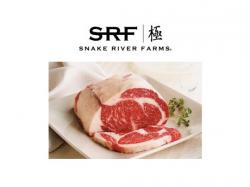Back To School With Beef 101: American Wagyu
August 28, 2013 | 4 min to read

BOISE, ID – Just in time for back-to-school, Snake River Farms has devised a special "lesson" for beef-loving foodies. Today's class? Beef 101: American Wagyu beef. Snake River Farms, the quality producer of American Wagyu beef, whose products grace the menus of some of the nation's finest Michelin-starred restaurants, provides a breakdown of the history and ABC's behind the increasingly popular American Wagyu beef.
"Although American Wagyu beef has appeared on restaurant menus for several years, some confusion remains about the origins of this style of beef and what makes it different from both Japanese Wagyu and other American cattle," said Snake River Farms' executive director of marketing, Jay Theiler. "With American Wagyu beef, ranchers offer a quality eating experience that exceeds the USDA's highest standards."
According to the USDA, American Wagyu beef comes from cattle with 50 percent or higher Wagyu genetics. While the American Wagyu can be pure bred, it is most often crossbred with high quality American Angus. In the rearing of these cattle, they must be fed for a minimum of 350 days, with no growth promoting hormones or animal byproducts used.
Kobe, Wagyu, American-style: What's in a name?
Wagyu is the breed that was made famous in the Kobe region of Japan, although Kobe is certainly not the only area in Japan where Wagyu cattle are raised. When it comes to describing the beef in the US, these two terms have become essentially interchangeable. In the case of American-style Kobe or American Wagyu, which both refer to the same product, a pure bred Wagyu bull is crossed with another breed, like Angus, with at least 50% of the genetics coming from the Wagyu side.
While purebred Wagyu beef originated in the Kobe region, it is not unlikely for the Japanese to cross-breed Wagyu. Most often, the Wagyu bull is cross-bred with Holstein — a fairly prevalent breed in Japan due to its use in dairy — to produce a variety of marbling levels.
American Wagyu: Where did it come from?
Wagyu cattle first came to the U.S. in 1976, when two Tottori Black Wagyu and two Kumamoto Red Wagyu bulls were imported. Between 1976 and 1994, only another 40 Wagyu cattle were imported to the U.S., creating the base of the Wagyu breed and highlighting the exclusivity of this line of beef. In 1999, Snake River Farms acquired a small herd of Wagyu cattle, which became the basis for its current herd.
Why cross breed Wagyu and Angus?
Wagyu is traditionally served in Japan very thinly-sliced in small portions, given the richness of the marbling and the high fat content. The Angus cross allows for a more traditional American steak-sized serving, while still capturing the rich, buttery flavor of Wagyu beef. Cross-breeding also helps with genetic diversity, reducing potential issues that can occur in purebreds.
Is American Wagyu beef raised similarly as in Japan?
There are some differences in the processes used to raise American versus Japanese Wagyu. American Wagyu are raised on ranches and feedyards similar to other American cattle, although they are fed special diets for up to four times longer than average American cattle. Given limited farmland in Japan, Japanese Wagyu are usually raised in confinement, most often indoors, in order to develop greater fat content and less lean muscle tissue.
American Wagyu: What's the difference?
A genetically unique breed, more ox-like in structure, Wagyu cattle provide a high quality dining experience and develop heavy marbling within their muscle. As a result, the beef is much more tender and flavorful than typical USDA top grades. "At Snake River Farms, we look to the Japanese grading system to determine the quality of our product," said Theiler. "The Japanese system grades meat quality according to 12 different levels, eight of which include marbling levels that begin at Prime and go up from there." Only about three percent of U.S. cattle achieve a prime rating. The Japanese system allows for further differentiation of highly marbled premium beef.
American Wagyu: What are the health benefits?
Beef is an excellent source of protein as well as vitamins B-6 and B-12, and American Wagyu beef has been found to have certain advantages over standard American breeds in terms of fat content.
American Wagyu is a good source of some essential fatty acids, particularly omega-6 and omega-3, and contains a much higher proportion of monounsaturated fats — the good fats — relative to saturated fats. Most traditional American beef has a saturated to monounsaturated fat ratio of 2:1, but American Wagyu is the opposite with two parts monounsaturated to one part saturated fats.
Snake River Farms American Wagyu beef can be purchased online and found in fine restaurants and retailers around the world. For more information or to order Snake River Farms products, visit www.snakeriverfarms.com or call 877.736.0193.
About Snake River Farms
Currently celebrating their 15-year Crystal Anniversary, Snake River Farms is passionate about delivering only the finest eating experiences, a luxury once reserved exclusively for the world's most esteemed restaurants. Featured on the menus of three-star Michelin-rated restaurants, and at top retailers and restaurants around the world, Snake River Farms products include American Kobe (Wagyu) beef, fresh Kurobuta (Berkshire) pork, and gourmet ham and sausages. The family-owned business began more than a decade ago with a small herd of Wagyu cattle from the Kobe region of Japan. The Wagyu bulls were crossed with premium American Black Angus to form a proprietary herd that has developed into one of the finest groups of Wagyu/Angus cross cattle in the U.S. Snake River Farms offers a full line of American Wagyu beef and Kurobuta pork products including gourmet hamburgers, hams, sausages, frankfurters and hardwood smoked bacon. All products are made with only the finest ingredients to ensure an exquisite eating experience. For more information, visit www.snakeriverfarms.com.
Source: Snake River Farms
